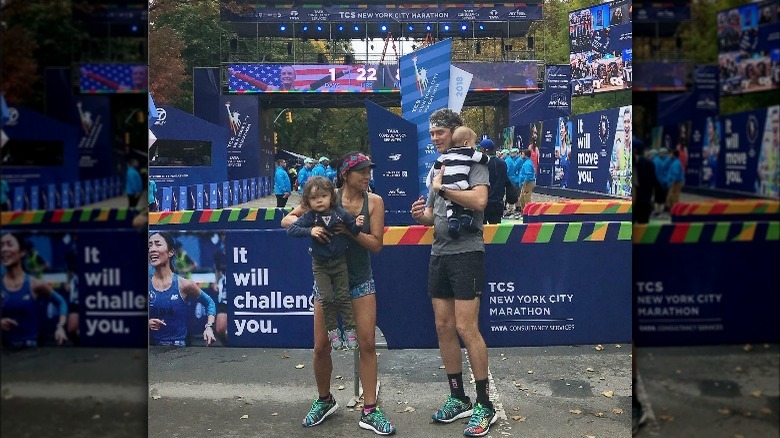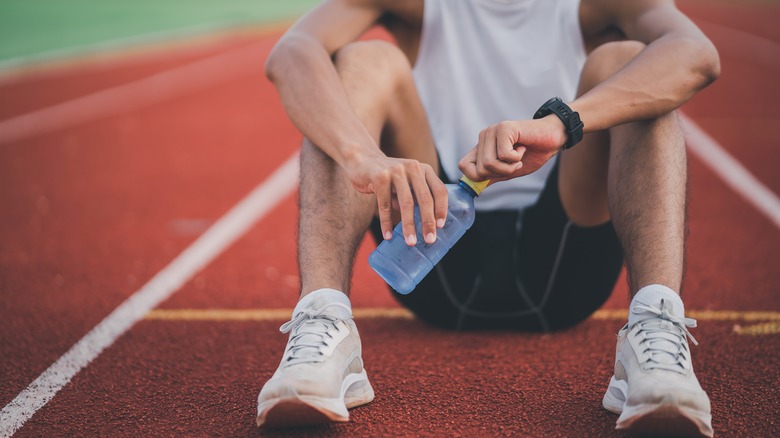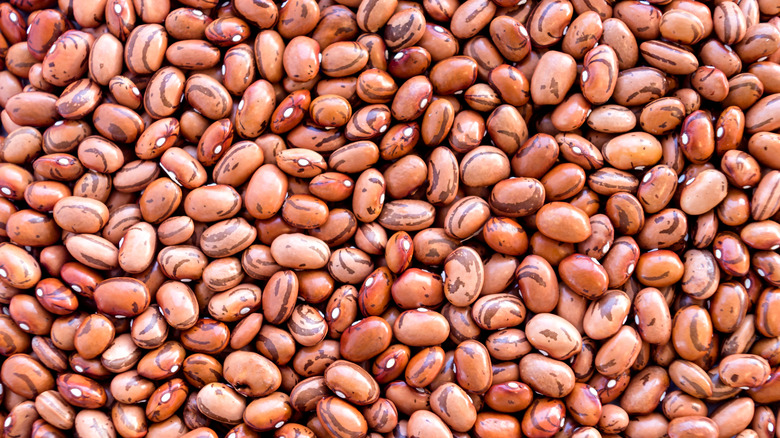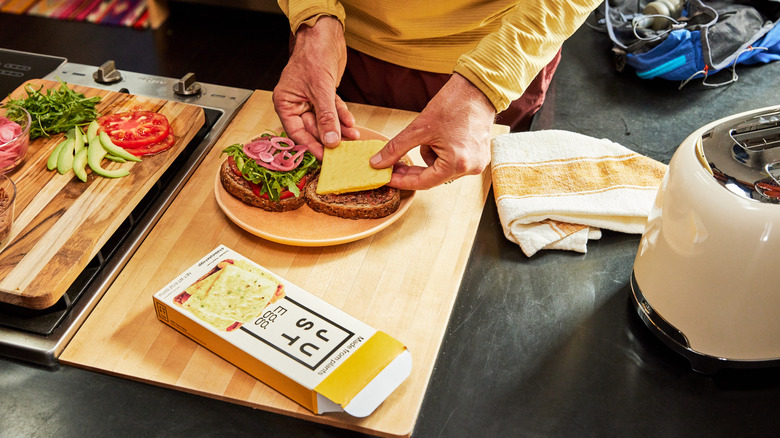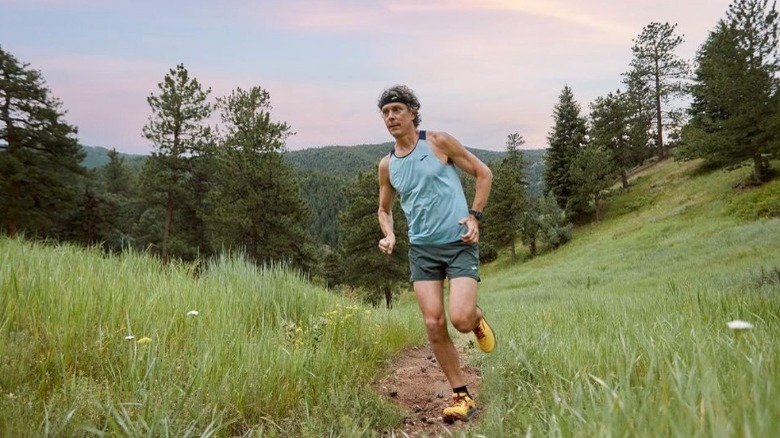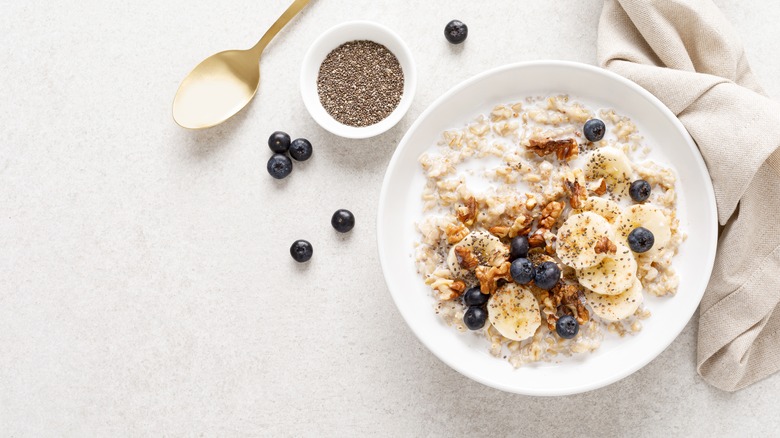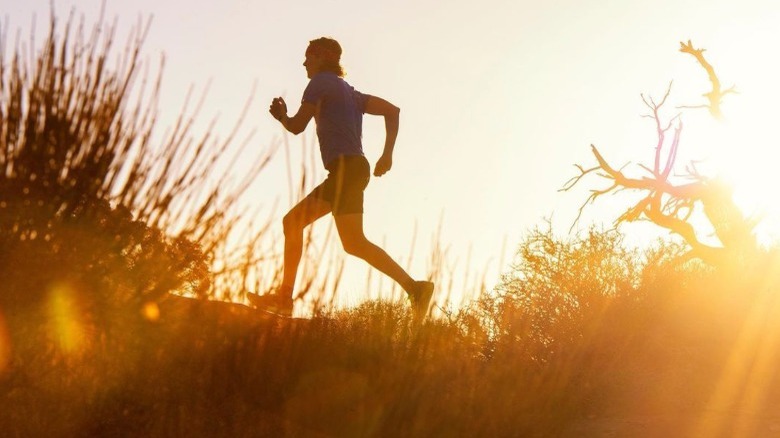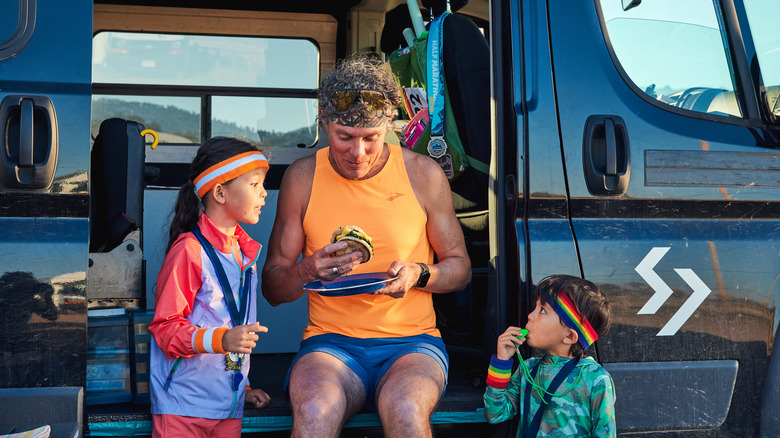Ultramarathon Runner Scott Jurek On Post Race Meal And Motivation Tips - Exclusive Interview
There are a lot of runners in this world, but there is only one Scott Jurek. Running can be misconstrued as a simple sport. It requires no extra materials like football or strength training — all you need is some feet on the pavement and a good set of headphones. The part that makes the sport so complicated is carrying that desire to push yourself beyond your body's normal limits. Whether it's three miles or the New York City marathon, running leads to a feeling of accomplishment like no other.
In an exclusive interview with Health Digest, ultramarathon runner and author of "Born to Run," Scott Jurek, opened up about what it's really like to endure the mental and physical tribulations that come with putting one foot in front of the other. Jurek partnered up with JUST Egg to reveal his post-race meals and tips that allow him to perform to the best of his ability. The Appalachian Trail speed record holder has garnered a mutiny of accomplishments, from running 164.7 miles in just 24 hours to winning the Western States 100-Mile Endurance Run seven straight times. Safe to say, runners should take his advice in stride.
Running is a lifestyle
You are considered one of the "greatest runners of all time." How has running become a comfort for you throughout the years?
It's become a comfort via knowing all the benefits it can provide. When I was young and early in my running journey, it was about all these personal goals I had and didn't quite understand all the benefits, and what's really cool about running, no matter where someone is on their journey, the benefits are immense. From the mental health benefits to the physical health benefits, to taking time to explore the world around me has been one of those things, that slowing down and moving meditation.
It's been really neat to see over the years and having this long illustrious running career — yes, I've had success, but [in] realizing and looking back, there's so many benefits to running, and running can morph and change for many people what the reasons are. It's gone through those changes.
It's like a lifestyle. I build it into not just, "I've got to go run because I got to stay in shape," or "I got to stay healthy," or that sort of thing. Now, it's like, "What can I do with it?" The longevity and the benefits behind it are so great. The people and the community, being out in New York City Marathon weekend and being back there after a four year hiatus with the pandemic and everything — It's about those personal connections in the community, and it was great to be around.
The energy of it is like no other, and it was very humid [November 6th] so I'm sure it was tough.
It was brutal conditions for the runners, awesome for the spectators. It was great to have it back at full capacity too, last year being only at a little over half. It was 30,000 people, so it's always an amazing and electric time of the year.
Ultramarathon running and pre-race dinners
You made the decision to not only run marathons, but you took it one step further to become an ultramarathon winner several times. How has the sport truly affected your mental and physical wellbeing?
What's neat about the sport is I've been around it long enough to see those changes. One of the things at its core is that it has allowed me to explore what I'm capable of and how I tackle such an immense challenge such as running a hundred miles or going beyond what I thought was possible in terms of temperatures and conditions. I've run through Death Valley in the heat of summer, running at high altitude, and blowing snow. It's given me this wisdom and understanding about what I'm capable of and how I can bring that into life.
When people go beyond what they think they can achieve or put themselves in that position to explore their potential, that is like the magic elixir of the sport of ultra running and specifically endurance events.
I'm going to switch gears to a few food questions. I understand that you are 100% plant-based. What does your dinner normally consist of the night before a big race?
It always changes. I've been plant-based for 23 years now, so I've been at the game for a while. It's one of those things where I've learned, like the night before the race, I'm the type of individual who loves whole grains, lots of raw veggies and salads. I try to, the night before the race, do more white rice the night before versus the brown rice. I do steamed veggies versus raw veggies.
A staple for me is something like tofu, white rice and some steamed broccoli, maybe some steamed kale — quite simple. Sometimes, it'll be rice noodles. I'm a big fan of those pre-race, but a lot of it's centering around simple, easy, plant-based foods to digest. Normally, I would go for high fiber, more raw veggies and more of it, but try to keep it simple in terms of digestion and making sure it goes through the system very cleanly.
What to eat during a race
That's interesting because the common myth is that you carbo-load the night before a race.
Yeah, and I do carb ... the one beauty of a plant-based diet is that it is a higher carbohydrate diet. You can swing it towards the protein side or swing it towards the fat side if you want, so you can customize it. Carbo loading has come back for a while. It was old school, and now it's coming back, because some people aren't as high-carbohydrate in their everyday diet, whereas my diet sits in 60, 70% carbohydrate a lot.
As long as I'm eating enough carbohydrates that night before, I wouldn't drop the carbs load. That's why the rice, the noodles — I definitely have carbohydrates. Sometimes it'll be beans, legumes, lentils, a type of soup — things that are easy to digest.
What about throughout the race? How do you fuel during? What are you grabbing?
During the race, it's centered on carbohydrates, because that's the most usable fuel that somebody who's running or doing endurance sports needs to ingest or eat while running. I'm doing anywhere from 25 grams, on the higher side, like 35 grams of carbohydrate, which is, for those that speak in calories, about 100 to 150 calories of carbohydrate specifically. I don't incorporate any protein or fat that would be in that range. It would be calories from carbohydrate, and that's every 30 minutes.
It's a real steady stream, and that's the key thing for those that did the marathon or are planning their next endurance event. You don't want to wait until mile 20 in a marathon, or you don't want to wait an hour in or hour and a half in. There used to be those common gel stations at those points, and it was a little too late to be getting the gels in, so it's really important to stay on that regular schedule. I'm doing a mix of gels., I work with Clif Bar, so a lot of times it's a Clif shot. It's centered around the gel blocks or gels or something that might be in a liquid carbohydrate mix, electrolyte drink.
Jurek's post-race JUST Egg breakfast sandwich
Water is a key part — hydration along with electrolytes, and I use electrolyte capsules versus relying on my electrolytes through the gels or through the electrolyte drink.
I'll definitely do solid food and real food when I'm doing these long endeavors like when I'm out on the trail for seven, eight hours, ten hours, which is a little bit different than somebody in a marathon where solid foods probably don't make as much sense.
You actually mentioned my next question for you. After finishing a marathon, your favorite go-to post race meal is the plant-based breakfast sandwich with JUST Egg. Can you walk me through how to make that?
The beauty is I can do that a couple different ways. The beauty with the folded product is it's literally popping it in a toaster oven, and that's my go-to. I'm a big toaster oven fan, so I love my toaster oven. I'll mix it up sometimes, but a lot of times, I'll do two of those. If I'm trying to do a denser amount of protein, I do a double stack of the folded JUST Egg product. [I can] do more of an omelet style [if] I have the time.
The beauty of the folded product is it can be toasted ahead of time, thrown on a sandwich with either a muffin [or] sprouted whole grain bread, and this is the time where, during the recovery, I'm not [thinking], "I want things that are white rice or white flour."
Sometimes, I'll put some kind of sauce or spread. I love things like hummus or black bean spreads to liven it up. Some people, when they finish a workout, aren't wanting spicy or lots of flavors, but I love spice, I love the flavors, so I'll throw on some spread, or a pesto is always nice. Sometimes, a couple slices of tomatoes are great for vitamin C, carbohydrate content.
Throw some JUST Egg folded in the toaster oven with some English muffin or toast or bread and spray a little olive oil, sometimes I'll do that too if I'm really in a pinch or [hurry], but having some handy spread is always great to add some flavor and texture. I'll throw on Tabasco sauce or a hot sauce on the bread.
Eat 20 to 30 minutes after a long run
You recommend eating about 20 to 30 minutes after a long run or intense workout or anything like that. Why is that?
That 20 to 30 minute window is really important in terms of glycogen uptake or absorption. A lot of research, and this has been around for years, but a lot of people don't always do it or they maybe heard it, or they don't always have something handy. That 20 to 30-minute window is critical. If you can imagine in the muscle cells there are these glycogen depots or these little storage closets, so to speak, and those close, or don't stay as fully open, after that 20 to 30 minutes. They found that athletes or those that exercised had better glycogen replenishment in their muscles if they consumed carbohydrates, which is a form of glycogen, so the protein helps push it in.
It has an important role with muscle regeneration and repair after workout, but it also helps with that glycogen replenishment. That's for somebody who's doing a workout in the morning, whether it's in the gym, a strength workout or a harder tempo or a lactate threshold session, a harder intense session, or something long, if they're doing their long run on the weekends.
If you're going out for your easy run or your easy spin on the bike or whatever, and it's not too long, you're most likely not going to burn through all your glycogen, so that 20 to 30-minute window isn't as critical, but it's always a good idea to have that mini meal. I call it post recovery, and that's where having a JUST Egg sandwich, having a banana, having an electrolyte drink is really key, packed the night before or morning before the workout so it's ready to go.
What Jurek eats the morning of a race
Take me through the morning of a race. What is the first thing that you do when you wake up to prepare from a nutrition standpoint?
It depends on how early the race is. I run a lot of races, particularly ultramarathons, and this holds true for somebody that's doing the marathon or those that are doing their fall or winter events. A lot of times, they start early, or they have to get on that ferry or that bus to the start, like a lot of New York marathon runners. I like to get a good solid breakfast in. If it's a race that I have two to three hours before from the time waking up to the race, it might be oatmeal, it's definitely carbohydrate-rich or mostly carbohydrates. A little bit of fat and protein is okay, but it might be a dense smoothie if I don't have as much time.
This is where liquids will be more readily absorbed than a solid food or a sandwich. It depends on how much of a window I have. If it's a 5:00 a.m. race and I wake up at 3:30 or 3:00, then I would lean more towards the liquid side. That's where a plant-based yogurt, a plant-based smoothie, is really good. This is where I would recommend to readers that they play with things on their long training runs and see what kind of things they can eat, roughly how close to an event.
Every body is different, so you have to figure out what works for you.
I also try to focus on electrolytes too before the event, so I'll do some electrolyte drink or a saltier food if I'm doing solid foods.
Jurek opens up about his 24-hour run record
I want to switch gears and talk to you about breaking the United States all surface record in the 24 hour run with 165.7 miles, which is crazily impressive.
That's including bathroom breaks.
Was there ever a time in this race where you thought, "I can't do this anymore, I can't finish," and how did you overcome it? What keeps you really motivated?
There were plenty of times. Even though I had so many ultra marathons under my belt, I've been doing it for, at that point, just under 20 years. I've done a lot of things, and it's important to let people know, even after all that experience, those doubts still creep into my head and they crept into my head at that time. Those are the moments that I went through, waves of those loads. That's one thing everyone hears about the wall that occurs in marathons that you hit this point where you don't think this is going to happen and you feel like, "Why am I out here? Why am I doing this?" That went through my head.
I had three or four waves of that over the 24 hours. I remember at one point, 18 hours in, running around as a circle. For 24 hours, something I normally do a ton of, I prefer to be in the mountains, on a trail, on the roads while covering some distance, so that part was even more mentally challenging. In those situations, it was important for me to remind myself, "This is a bad spell, things are going to get better," and that's important for readers to know — it's very common to experience that, and acknowledging it and sitting with it is okay.
Understand, be emotional about it. If something's going wrong or the stomach's [aching], or you have some other issue with something that's bothering you, a cramp or something that seems like an injury, then it's time to move on from those and try to figure out, "How can I remedy the situation? How can I put a positive spin on things and start thinking about what, strategically, can I do to change the predicament or the situation I'm in?"
With the mental side of things, it's like, "Let's focus on getting to the next spot in the road. Let's focus on getting to the next climb, the next few miles." Biting that larger goal into more digestible pieces is key on the mental side.
What Jurek wished he knew earlier in his career
Focusing on a new target, on something that I can see in the distance — it might be another runner — and using that can take me out of that situation. For some people, they're running for somebody who can't. My mother was always a big inspiration in that 24 hour race. She had just passed away a couple months earlier. She was in a wheelchair, and I constantly remind myself of what she went through in her life and not being able to move her body. Here I am, I'm able to run this race, and even though I'm uncomfortable and not feeling it, I'm out here choosing to do this.
I think that's great advice for life as well, knowing that it does get better, that you can cross the finish line. What advice would you give yourself as a runner now that you wish you knew earlier?
Acknowledge the fun in the sport and the journey. I didn't really think about a lot of the deeper aspects of the running initially and that's okay. I don't think it was bad that I focused on, "How can I get better?" A lot of people do that. They are focused on their PRs and these goals and I often didn't think about the deeper meaning of what I was doing out there.
I did have fun, because I kept going back for more. There is an enjoyment, even if there's a chosen suffering that's inflicted a lot with endurance and ultra endurance sports. Always remember the fun and the joy in running, because sometimes I lost that throughout my career.
It's hard to push yourself when you don't feel like it.
It's hard to stay sharp and hard to stay motivated. That's a struggle for everyone in any passion. That's trying to exercise for health and fitness, any kind of work or hobby or raising a family, having kids, all those things.
Jurek reveals his next goals
What's next for you? What's your next goal? What are you reaching towards?
I have a desire to do something on the scale of the Appalachian Track. I've toyed with some different ideas and I'm in that mulling stage of, "What really gets me excited?" I know I want to do something relatively big again, like a month and a half long project, a speed record. I had another go at the Appalachian Trail two summers ago, and it didn't go great. I had an injury early on the weekend, so that one's stung a bit because you prepare for a huge endeavor.
There's a bunch of places I want to explore after being in New York City this past weekend, and my wife's been training the past few months for a marathon. Sometimes I'm like, "It'd be fun to see how fast I can get my marathon pace again."
What's your lowest marathon pace?
I've run a 2:38 a couple times. It's not that fast compared to the winners of marathons now. At this point in my career, because I have accomplished a lot, it's finding the things that get me excited. I've done a lot of guiding of my visually impaired friends and focused on that a lot over the last couple of years. The last time I ran the New York City Marathon, I was guiding my blind friend for the entire race.
It's more than personal endeavors, which I did for so many years and always still gave back to the community and volunteering, and hanging out with my kids and getting them experiences of being out in the outdoors and whether that's running or hiking and exploring too. Whether or not they run ultra marathons, that's okay.
Head to JUST Egg's website to learn more about its products. Keep up with Scott Jurek's running career on his Instagram page.
This interview has been edited for clarity.


